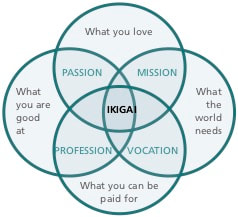|
Photo by Maren Wilczek Some people seem to have a very clear vision of where they are going and where they want to get to in life. Whether or not they make it seems to be less important than having an end point to aim for. In contrast, many people don’t have a clear set of goals and find the idea of creating them quite daunting. For the people in the second camp, they often slowly get a sense that they are failing to achieve their potential. And, I find, this can lead to a negative spiral, a catch-22, where you never know if you are on track if you have no clear destination.
Richard Boyatzis, an expert on intentional change says that “we become what we dream” and that in order to do that, we need to be clear about who we wish to be and what we want to achieve in our lives. He is fully aware of how overwhelming it is to allow ourselves to dream and has come up with a series of tools that shift out out of the negative spiral and open up the creative side of our mind. There is one thing I'd recommend doing - one of Boyatzis' “Dreams of the Ideal Future” exercises - that can be very effective at helping with this. It’s also very simple. You just need to list 27 or more things you’d like to do or experience before you die. I would encourage everyone to have a go. You may not get to 27, and that’s OK. Its less about specifics (e.g. places you’d like to visit) and more about experiences (e.g. go for a walk with a future grandchild or give a speech at your child’s wedding). It may help to explore what you would have liked to have achieved at different future life milestones, like having gone skydiving by your 75th birthday or climbed Mount Everest by the time you are 50. I really encourage you to play with this. Time is a curious quality and most people don’t have a good sense of how quickly it passes, especially when you are focussed on other things. My vision for the future is to help people find their happy path in life and at work because being unhappy is just a sign that something needs to change! And if you want some help with seeing your future more clearly, give me a shout. McKee, Boyatzis and Johnston, Becoming a Resonant Leader: Develop Your Emotional Intelligence, Renew Your Relationships, and Sustain Your Effectiveness, Harvard Business School Press, Boston, Mass. 2008
0 Comments
Photo by Jeff Kingma I speak to many people each week who suffer from a nagging doubt that they are not fulfilling their destiny. It may show up as a sense of frustration or disappointment in current circumstances, as sense of falling out of love with one’s career or it may be a lingering sense of missing out, that there is more to life if only one knew where to look for it.
As far as I am aware, there are two schools of thought on the subject: the Steve Jobs ‘do what you love” angle, where we are encouraged to believe that firstly, there is a single thing that each of us loves and, secondly, that it is possible to build a life (and income) around it. The other view is that you need to get good at something and the love for it will follow. What's interesting is that these seemingly opposing pieces of advice are only helpful for people who have something that they know they want to do and don’t offer much in the way of crumbs for people who may have a range of things that they are mildly interested in. The British education system is not designed for what we could refer to as generalists, because it asks us to start homing in on our careers when we are in our mid-teens: first with GCSEs and then more ruthlessly with A-levels. People often make choices based on what they believe they will get good grades at or based on external guidance (parents, teachers, etc) rather than having a strong sense of self-direction. At some point, many people who have been following this path, chaining from one near-term goal to the next - get good grades, get a degree, get a job, get a promotion, and on and on and on - wake up and wonder where they are and whether they are happy with their lives. This is summed up beautifully in the song Once in a Lifetime by the Talking Heads which encapsulates the thoughts of someone who has woken up to a life that they made unconsciously. Maslow’s hierarchy of needs model helps to explain this: they may have been focusing on the lower parts of the pyramid, addressing their physiological and safety needs and hadn't paid much attention to considering their more sophisticated needs of esteem or self-actualisation. Helping people make sense of who they are and what their purpose is, is is something I do a lot of. I work with people when they feel that change is needed at work, either because it’s being imposed on them, due to a restructure maybe or because they feel like they are trapped. One of the key activities we do is to explore their purpose. I have already shared my preferred tools for this, which are the IKIGAI and Simon Sinek’s “What, How, Why”. Finding your purpose is like finding your true self, the person trapped under all the weight of cultural expectations, undamaged by life's challenges, the person you were born to be. Be careful because once you meet them, your life will never be the same. You will have a glimpse of your future and there is no going back from there. Are you ready to meet the real you?  I loved Simon Sinek’s Start With Why. It felt like he had explained how the world should work. His basic premise is that that we can inspire others by putting the Why (the purpose) before the How (the process), or the What (the product) because it builds an emotional connection. Apple are a great example of a company that do this very well. They have customers who adore them and wait all night in the rain to be the first to use a new product. I have a strong “bullshit radar” and it is triggered by inauthentic people and organisations. At times it gets so loud, it interferes with my ability to think and function well. I have found myself at odds with people and employers because I find their lack of integral harmony deeply disturbing. Thats not to say I expect everything to be totally aligned all the time. I also have a huge amount of sympathy for people and businesses that are trying to navigate in imperfect circumstances and have to compartmentalise parts of themselves in order to appear to be sane. A degree of incongruence is a fact of life and we need to be very understanding about that. It’s just when the dirt they have been sweeping under the carpet gets to be bigger than they are, its definitely time to acknowledge it and see what needs to be done. Usually, people or businesses that trigger my authenticity radar simply do not have a true reason for being. They are normally caught up in the pursuit of a very narrow focusses success (money or fame) rather than being driven by a true mission or vision. This leads to them saying or doing whatever it takes to get them towards their goals. We’ve all met a few of them or seen them on reality TV programs. Some of the extremely “successful” ones have been able to take public office. Simon Senek’s book is terrific at explaining the benefits of finding your true purpose, but less good on the how. His second book, Find Your Why, aimed to help us all find our purpose, has turned out to be less helpful. You are reliant on having a very astute and insightful friend to point it out to you. Sadly, I and others lack such friends.  Another approach is using Héctor García and Francesc Miralles approach in Ikigai: The Japanese Secret to a Long and Happy Life”. The Japanese letters used to denote, ikigai represent “life” and “to be worthwhile.” Everyones’ Ikigai will be different and some seem more ambitious than others, but having a sense of meaning can contribute to a longer life and improved well being. The Japanese believe we all are born with an ikigai, we just have to find it. The process is simple, you need to find:
And the intersection of all of those things is your ikigai, your reason for being. Finding your purpose is very liberating. It becomes the compass that guides your life. Suddenly, it’s a lot easier to make decisions because you know what to focus on and what is ok to let go. I recommend you try it. You’ll need to spend time looking back over your past, at what you have enjoyed doing over the course of your life and see if you can recognise any patterns or themes. When I did it, I noticed a thread that runs through my life which is about making life easier for people. My original degree was in design. I wanted to mass produce things that would add joy and simplify peoples lives. When I “fell” into the digital world, I quickly found a home in user experience design, again driven by a desire to create experiences that was shaped by the customers wants and needs, not asking them to contort themselves to the shape of the business. And now, as a coach, my driving ambition is to help people find a way to navigate their lives towards what brings them joy and fulfilment rather than being pushed around by false beliefs that have accidentally acquired from childhood onwards. Finding your life purpose on your own isn’t always easy. I've made a cheat sheet to help you do it. If you need some help, give me a shout. |
Author25 years experience in helping teams build user centred products and services, now helping digital colleagues learn how to bounce back better than before from the challenges life throws at us from time-to-time. Archives
December 2022
Categories
All
|



 RSS Feed
RSS Feed